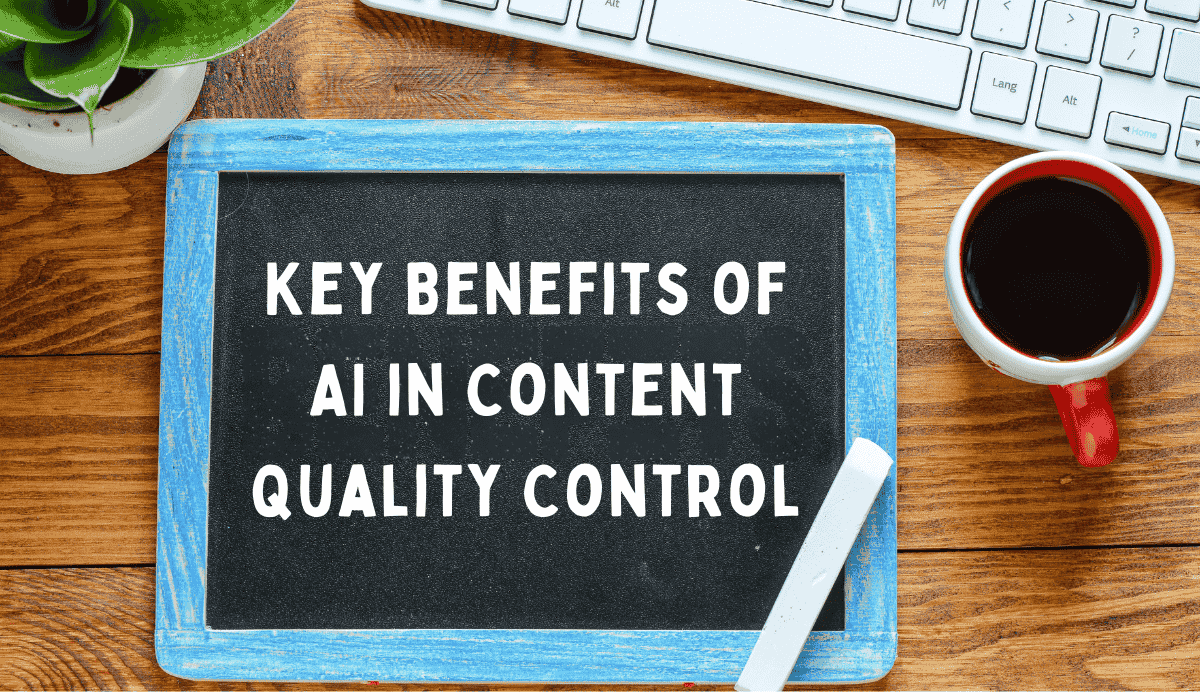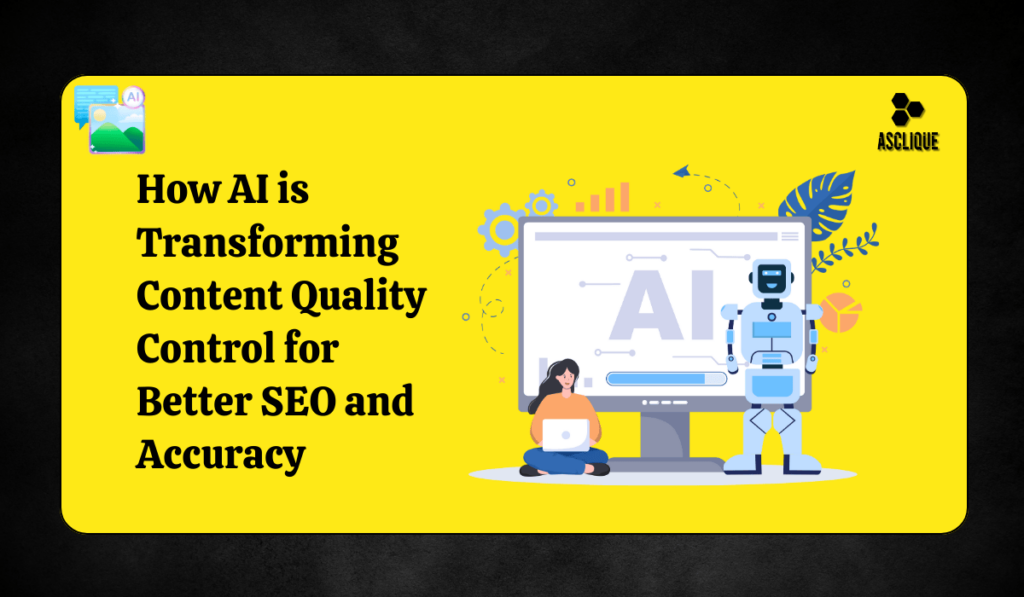The control of content quality is important to maintain credibility, improve SEO, and add value to the audience. However, it is very wordy at times and often a breeding ground for human mistakes in trying to ensure that everything that goes into content meets a high standard. Enter Artificial Intelligence, or AI, game-changer for content creation. The AI-driven tools now are changing the way of reviewing, editing, and optimizing content. Today, let’s talk about how artificial intelligence can change the game in content quality control and why the businesses have to embrace this technology.
What is AI for content quality control?
AI for Content Quality Control applies artificial intelligence technologies such as natural language processing and algorithms in machine learning to automate and optimize each aspect of content creation and subsequent editing. Thus, these technologies can evaluate content based on a lot of criteria such as grammar, spelling, tone, structure, readability, keyword usage, and overall performance in SEO.
Content quality control tools operating on AI are like a virtual editor who ensures content produced is to the highest standards before its publication or dissemination. With such tools, businesses are able to produce quality content that creates uniformity and coherence; that will reach their audience through higher search engine rankings.
Benefits of AI in Content Quality Control

-
Enhanced Content Accuracy and Consistency
The most important strength of AI content quality control is that it allows for the promotion of accuracy and consistency. Many human errors characterize proofreading and editing, as they are slow processes. However, AI can rapidly identify misspelled words, grammatical errors, and awkward sentence constructions. This contributes to maintaining the quality of high standards and assures clear, concise, and error-free content.
In addition, AI ensures consistency in the writing style and tone. The latter often affects content quality because it is sometimes difficult to end up with a piece that reflects the brand’s voice. It’s most useful for businesses requiring a constant tone in different pieces of content, such as blog posts, social media updates, or product descriptions.
-
Readability and Engagement Improvement
AI tools are also designed to improve the readability of content. They analyze factors like sentence length, vocabulary complexity, and overall flow to make the content more accessible and engaging to readers. AI can suggest changes to improve readability, such as breaking up long paragraphs, replacing complex words with simpler alternatives, or rephrasing sentences to improve clarity.
In today’s digital world, the reader does not have much time to go through the content. AI makes the content easily digestible. Keeping visitors engaged is the only way to decrease the bounce rate, and improving readability is a direct result of this. Business increases conversions when their audience stays around.
-
SEO Optimisation
Another feature that defines the quality of content is its ability to rank well on search engines. Artificial intelligence-powered tools can analyze your content for SEO optimization, checking keyword usage, keyword density, and relevance. Such tools might return suggestions for keywords or phrases to rank high on SERPs.
These AI tools further check on-page SEO elements, including meta descriptions and title tags, as well as even alt text for images, to ensure they are optimized completely for search engines. They can check out the competitors’ content and even give suggestions on how to outdo the others in terms of their SEO performance. With AI, business houses can improve organic reach and drive more traffic to the websites.
-
Time efficiency and cost-effectiveness
AI tools automate all the mundane works that are in conjunction with writing and editing. They include proofreading, grammar checking, and analyzing the SEO friendliness of content. Thus, there are opportunities for content creators to engage in other aspects of their work, such as brainstorming ideas, researching, and writing.
Automation of repetitive tasks can save both time and money. Companies need not hire many editors and proofreaders because AI can perform the task with great efficiency. This is very useful for businesses that have fewer resources or are generating a large volume of content.
-
Content Personalization
AI-powered content quality control tools can also help enhance content personalization. The tools analyze data and behavior among users to identify the best customized content strategies to recommend. Through AI, any business can mold its content toward specific needs and preferences of their target audience so that engagement increases and conversion becomes better.
For example, it can analyze audience segments’ preferences and trends to suggest adjustments that would better align with the respective audience. Tailored content provides for better experience for users, increasing the chance of a lasting relationship with a customer.
How AI Relates to Content Quality Control
Grammar and Spelling Checker
The very basic and one of the widely known applications for AI in the content quality control is grammar and spelling checks. Tools like Grammarly, ProWritingAid, and Hemingway Editor use AI technology to detect possible errors in grammatical, punctuational, and spelling features. These could instantly identify, suggest corrections in, and further explain why corrections are necessary at times, with the aim to polish and be professional in what is being made.
Tone and Style Detection
For brands to have a recognizable voice, they must maintain a consistent tone and style. AI-powered writing tools like ProWritingAid and Grammarly can analyze whether the tone fits the brand persona of the particular piece of content. They offer suggestions to suit the formality or casual conversation or even chat depending on what is required based on the specific target audience of the content being written.
Readability Enhancement
AI tools include the Hemingway Editor and Readable.io to analyze for readability in text. Their methodology involves scanning word choice and phrase structure together with paragraph lengths. This all assists in enhancing an article for proper readability in and out, keeping it accessible by making lengthy paragraphs or words appear more friendly while simplifying such complex sentences with suggestions as possible.
SEO Optimization
SEO is one of the most crucial aspects of content creation. Clearscope, SEMrush, and SurferSEO are AI tools that help in optimizing content with search engines. They analyze the usage of keywords and provide suggestions for better optimization. These tools can also give suggestions for related keywords, analyze the competition, and analyze the overall SEO structure of the content.
Plagiarism Detection
To avoid plagiarism, companies employ AI-plagiarism checkers like Copyscape and Turnitin. This software detects matching material that can be found online by identifying duplicated content and marking it as a potential case of unintentional plagiarism, which will keep the creators away from plagiarism in their work.
Content Scoring and Performance Analysis
Most of the AI tools take it up a notch further by providing an actual content quality score. These tools, including ContentBot.ai and MarketMuse, base their content review on various key factors such as keyword usage, structure, readability, and the performance of their SEO. Their tools give overall performance analysis by providing insights for improvement.
How Businesses Can Leverage AI for Content Quality Control?

Choose the Right AI Tools
First and foremost, AI for content quality control should start with the proper selection of tools for your business needs. Not all tools will specialize in a particular aspect of content creation. Therefore, choosing the right tool for your goals is crucial, taking into account the size of your content team, the kind of content you create, and your specific requirements for quality control.
Integrate AI into Your Workflow
Having made this decision, now is the time to embed those AI tools in your workflow when creating and editing content. Many AI-driven applications are designed with ease of integration in mind. They will, for instance, easily be implemented into the existing CMS that supports your application and content needs like WordPress or Google Docs.
You can have the assurance of putting every content under a full-scale quality check process before being released to the public by infusing AI in your workflow. You will therefore not have variations or low quality products in any content.
Train Your Team to Use AI Effectively
AI tools are as good as the people who operate them. So, for your content team to get the maximum benefits from using AI tools, they should be trained on the effective use of these tools. This should encompass how to understand AI suggestions and how to infuse those into the content in a manner that does not infringe upon the creative value.
Monitor and Adapt
AI tools continue to evolve and improve as they learn from user interactions. The more you use these tools, the more you will be able to monitor their performance and adjust your content strategies accordingly. With time, AI can give you deeper insights into your content performance and help you refine your content quality control processes.
Conclusion
AI for content quality control is more than just a trend — it’s the future of content creation. It can help enhance the quality, accuracy, and engagement of your content while saving time and resources. Whether you are a small business or a large enterprise, AI can help you create high-quality, SEO-optimized content that resonates with your audience and boosts your online presence.
Content quality control through embracing AI is the step toward efficiency, consistency, and success in the ever-evolving world of digital marketing. Bring on the future of content creation through AI!
FAQ’s
What is the role of AI in content quality control?
AI automates content analysis, improves grammar, readability, SEO, and tone consistency. It ensures that the content is accurate, engaging, and optimized for search engines.
How does AI improve content readability?
AI tools analyze sentence structure, word choice, and flow, suggesting improvements like simplifying complex phrases and breaking up long sentences to enhance clarity.
Can AI Assist in SEO optimization?
AI tool SEMrush, SurferSEO keywords usage, density, and content structure analyze them for suggestions on how to enhance SEO performance and better rank on search engines.
Does AI identify plagiarism?
Yes, AI-driven plagiarism checkers such as Copyscape scan the web to identify for duplicate content that ensures your product of creation is authentic and free from plagiarism.
How can businesses incorporate AI into their workflow on content?
Businesses can integrate AI by choosing the right tools, training their teams, and incorporating these tools into content management systems for efficient quality control.

